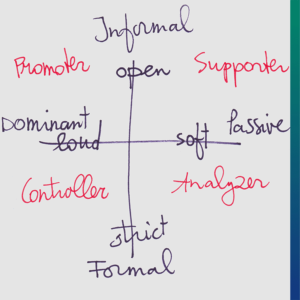
I guess everybody does it; sitting on a terrace and watching other people’s behaviour? I love it, especially when something happens of which you know the outcome before it occurs. 🙂
I knew when I heard the elderly couple arguing about which way to go, he would have it his way and she would be right in the end.
So she reluctantly followed him and after 100 meters plus another argument, they turned around and passed us again going in the opposite direction.
It wasn’t very effective communication between couples. He didn’t want to listen to her and was only focused on having it his way. She was obviously not capable of talking to him in a way that would convince him without giving him the idea he was stupid.
Some of the links might be affiliate links. As an affiliate associate, we earn a small commission when you purchase any of the products offered through the shared links at no extra cost for you. This helps us to maintain this website.
Table of contents
Taking each other for granted

The biggest problem concerning communication is either the desire to change each other or taking each other for granted and therefore not listening carefully enough.
When my son befriended a girl with a smoking addiction, he remarked “She will stop if she loves me enough”. Of course, that didn’t happen.
When Tom and I met each other we were really young – 15 when we met, 19 when we got in a relationship with each other – and I too thought he would change the things I didn’t like. We have known each other for over 50 years now and although it took some time, ever since I skipped the idea of pushing Tom into my mould and honestly listening to what he says, we don’t bicker anymore.
Some people treat strangers nicer than their own spouse and that is a kind of behaviour I really hate. Habits easily creep in and in communicating with each other it’s important to stay patient and nice.
Willing to listen to each other

We have 2 ears and 1 mouth. This is a nice indication of how we should go about our communication. Listen twice as much to the other person than talk.
Don’t you catch yourself at times you are busy formulating your story for when it’s your turn instead of listening to the rest your partner is telling?
When we emigrated to Spain and left our old friends behind, I realized how much of our conversation is based on what we think we know.
Our new connections approached us neutrally and things that we thought were obvious to everyone needed to be explained. This had a huge impact on our own communication with one another.
Related: Avoid Loneliness. How to Make Friends When you are Older?
Cultural differences

There is a lot of culturally determined obviousness in our communication. Tom and I are both Dutch and grew up in the same town, so we literally speak the same language. Our son is married to a Spanish girl that spent her childhood in Colombia, so they have to deal with cultural differences.
I realized this all the more when I invited a new neighbour for a coffee. For us, Dutchies, inviting someone for coffee, means you want them to have a drink with you in the morning. It doesn’t have to be coffee, it can be tea as well.
She suggested 6 pm. For us, that would be the time to have an aperitif. Next time I won’t use the word coffee, but ask if someone wants to come in the morning! 🙂
Different styles

Apart from the time we have spent together and our culture, we also have a different character and upbringing. As a result, we all have different communication styles.
Communication experts have made their own classification and we can learn a lot from those differences.
Those classifications are not meant to turn us around into a different style, but to give us more understanding of other people.
Once we know that people don’t intently misunderstand us, but just have a different filter on their ears, we can use other words and a different tone of voice to say exactly the same as before with more results.
Open Circles
In a seminar, I once attended 4 communication types were described. The funniest part of the day was the play that we performed as groups of the same type. The subject of the play was “How does your ideal meeting look like”.
For the watchers, it was hilarious, because we just couldn’t believe the ones on the stage really thought they were communicating effectively with each other. But since we all performed in a play, it gave a big understanding of what it means to have different communication styles.

- Promoter, is always full of new ideas and wants to do everything, as long as it is fun. They make connections easily, but are also quickly bored. They are easily persuaded to do something if it’s presented as a fun event. ‘Let’s do this together’;
- Controller, has goals and doesn’t want to waste time. They come to the point quickly, no chit chat. Their attitude can seem very abrupt, especially for promoters.’This event will take you half an hour and this is the address’;
- Analyzer, wants everything to be accurate and precise. They’re the ones that will note a typo right away and hate making mistakes themselves. They won’t say anything anymore if someone upsets them. ‘The event will be attended by 100 people, you will have time to ask questions and you will get a summary’;
- Supporter, above all, wants everyone to feel good and comfortable. They value love and friendship the most. As long as everyone feels good, it’s okay for them, but they don’t want to be forced. ‘If you want, you can go to that event’.
For the play, every group had 15 minutes. To give an idea of how it went:
- The promoters couldn’t agree on the way to handle the meeting. They were loud and all talked at the same time. It was complete chaos and part of the group got so bored with the others they started their own meeting at the other side of the stage;
- The controllers had their meeting done in 10 minutes. They had agreed on forehand who was the chairperson and listened to each other;
- The analyzers were talking quietly with soft voices. They pointed out the mistakes in the minutes of the previous sitting and lost themselves completely in irrelevant details (irrelevant to others, that is);
- The supporters never got to the agenda, because they kept talking about holidays and films, and were surprised when the 15 minutes were gone. All the time they talked about their feelings and wanted to know how others were feeling.
Mind you, rarely anyone is exactly that type for 100%, there are nuances.
NLP
My first introduction to NLP came in a book by Tony Robbins. NLP means Neuro Linguistic Programming. It has a negative connotation for some people because the object of NLP can be to influence people. Hypnosis is also mentioned a lot in connection with NLP.
It is my strong conviction you can use NLP also for the good. It can mean you have a better understanding of other people and their behaviour. And by listening carefully to the type of words people use you can distinguish them from each other.
The types described are:
- Visual, prefer looking at images. These can be real images, but also a visual way of describing. ‘I see what you mean’;
- Auditory, like hearing the most. ‘I hear what you mean;
- Kinesthetic, prefer a physical approach. ‘I feel what you mean’.
B.A.N.K.

I used the B.A.N.K. method for some time when I had my business in the Netherlands. It’s a very quick way to discover the style of someone. I had 4 cards and asked prospects and clients to put them in order of their preference, based on the values that are written on the cards.
The basic idea is that 2 of the 4 types are dominant and the other 2 are usually types that we don’t get along with.
- Blueprint;
- Action;
- Nurture;
- Knowledge.
It looks a lot like what I learned from Open Circles. For example, it made me get along better with my son, who is a true Promoter/Action type. For me as a Controller/Knowledge type that has been difficult, until I understood how it functions.
Final words

Knowing a communication style doesn’t mean you instantly know how to address people best. That takes practice. But knowing there are different styles can make us very aware of what is going on in conversations.
Communication is not what we say, it’s how we say it. In addition, it means listening carefully to each other and paying attention to our body language. Effective communication between couples is listening intently to each other because it is tempting to think we know each other so well that we no longer pay close attention.
Having an idea of what communication type your conversation partner has, gives you more chances of communicating effectively. A conversation is not about who is right, but about what we want to achieve.
Do you have an idea what communication style you have? Tell us in the comment box.


I think I am a controller/analyzer. I always get straight to the point and I absolutely hate wasting time. Instead of giving long monologues I prefer to say things in one or two sentences. I also always avoid repeating mistakes of past events or meetings, learning from mistakes (of mine and others’).
Communication is a tricky thing. I am a teacher in junior high school, and sometimes I give an explanation of a certain subject, which not all students understand, because first of all, some are auditive, others are visual, and others are kinethic. Then there is the age difference. So, what I do sometimes, I let students who understood the class explain it to them in their own words, and that often helps.
I think that regardless of what age, communication is the one thing we have to keep on working on, and we – including myself – tend to neglect that. I also understand about the differences in cultures. I am from Belgium and I live in Mexico. I can no longer adapt to life in Belgium. It’s a culture I find hard to adapt to now.
Briljant idea, Christine, to let the children among each other explain things. And very good that you are aware not all students learn the same way. When I started teaching I had no idea! What subject do you teach?
Since my own departure to Spain I have only been once to Holland to arrange for the moving of our stuff, so I have no idea yet whether I could blend in again. But like you I love being in a different culture, even when that poses new difficulties. 🙂
Hi Hannie,
Great article! Me and my wife should definitely use some of the advice you are giving here. We are often arguing about minor things and it can really ruin the mood. Coming from different cultures from opposite sides of the globe there are many differerences in how we are used to handling things.
It’s also hard to always remember to be respectful to each other especially when you´re in a hurry or tired and irritated. I will tell her to read this article and maybe that will help!
-Joonas
What a pity you quarrel a lot, Joonas. For your reassurance, Tom and I did that too when we were young. I’ll tell you what helped me enormously: people tend to be nicer to strangers than to their own partner. When I realized that, I tried to step back at times and tried to imagine how I would have responded to a stranger or a friend.
That realization and the thinking of different types of communicators improved our communication hugely. 🙂
Hey,
Interesting article on communication between couples. I talk about communication in leadership a lot and how important it is in building trust between a leader and his/her people and strengthening relationships, and that the leader should do 80% of the listening and 20% of the talking in one to one situations. The other person must feel cared for and feel heard. It is slightly different between couples I believe because it is an equal partnership, it is really interesting to keep learning about different types of communication.
Thank you for sharing and keep up the amazing work.
All the best,
Tom
Hi Tom. In my eyes even an effective leader can have an equal relationship with the people he leads, so I don’t think the communication is much different between couples or in the workplace. But your 80% listening / 20% talking is a sound advice for everyone. 😀
This is such a highly useful post for most of us living with someone at home or in a close relationship. I found I sometimes do tend to not listen to my spouse of 7 years (well, today!) fully and already had assumed what he’s going to say.
That assumption can be correct most of the times but NOT always, which creates a bit of muddle up between us or just in my head.
I think next time, I will try to listen to him fully before butting in or assuming the point of the conversation. Also, I won’t try to mold him into my version, which most of us automatically do. But instead, let him be him, as that was the person I fell in love in the first place!
In terms of the communication I am probably the analyzer and prompter most of the times.
Thank you for this interesting post on effective communication between couples.
Indeed, don’t we all try to mold our partner into our desired version, Rani. *raising my hand, guilty* 🙂 It is interesting to know what type Habib is, because I have found out by learning Tom’s and my communication type, what the effect can be by understanding those types.
Oh, and HAPPY anniversary!!
Thanks for this article on communication Hannie. As a mother of five grown children I can attest to different communication styles within the same household. At times things could get pretty heated around this house when they all lived home. Most of the time everyone got along great and communicated calmly and respectfully. But the few times things got out of hand, well let’s just say I am thankful we all survived those turbulent teen years. Now they are experiencing that in their own households. My husband and I rarely argue, we have learned to communicate effectively with each other and quite literally are each others best friend. This August we celebrated 30 years together and I still choose him for the next 30 years or more, God willing.
Ha, I can imagine the raquet going on at times in a house with 5 kids. We had it already with just one. 🙂
That’s so good to hear you have celebrated your 30th anniversary and I sure wish Rick and you another 30 years. It’s marvelous when your spouse is also your best friend, isn’t it!
It really is the best.
I think that I am a controller. At the end of the day, I really strive to be a supporter, but hate wasting time. I come off short with my boyfriend a lot…while he wants to relax watch T.V., and talk in detail about minor parts of his day, I want to work on my business and future. I don’t like living in the past. Our different personality’s causes us some turmoil, but I think even just being consciously aware of our personality types can help us meet in the middle somewhere. You know what they say…opposites attract! Also, a relationship with strong love always can be mended, as long as both parties are MUTUALLY willing to dig deep, find the root cause of distress, and find a solution. This was a great read. Thank you!
Exactly, Courtney. If we were all the same, life would be boring. Our differences can cause distress, but meeting in the middle is a great starting point to work from. Understanding for the different types of communicators can be so helpful!
While reading your article, I found out many things about myself. I have been in a relationship for over 6 years now and one of my weaknesses is that I hardly listen. And I am trying very hard to work on that. Another thing I observed, was that sometimes I get too comfortable around my fiance, that I don’t seem to care anymore or improve on making our relationship better.
As for the communication style I am more of a controller. Always wanting to get things done my way and not having much time to waste.
Thank you for the great post I have learnt a lot and I will improve on myself.
I am so pleased to hear that, Rinelle, gaining consiousness about your own style of communication and especially if you are brave enough to admit the flaws (which we all have, don’t worry) is a great starting point for improvement. Well done! I am sure your talks will be better from now on. 🙂
*doing a happy dance*
Hi Hannie,
B.A.N.K. is a very clever tool and one I’ve previously also used with my work colleague. It was a simple team building exercise which helped us understand what our colleagues strengths were and how I could benefit that within the business.
It not only helped me but other members of staff, they were soon working with the members of team which they felt would help them better and not sticking with their close work mates.
A great article, keep up the good work!
Damon
Thanks, Damon. And you’re right, these tools are not only useful between couples, but in the workplace too. Broadening your view, as your colleagues and you did, always makes the work better.
I agree with Tom’s comment. Communication is 80% listening 20% responding. One thing I discovered that most people do the opposite. I do it sometimes too. If we talk all the time, we don’t have time to hear the other person and that is going to lead to the end of communication for sure. Been there, done that. That is why I like to read posts like this! Thanks for sharing and helping me to understand how to communicate in relationship effectively.
You and Tom are probably right, Ivan. I always say we have 2 ears and 1 mouth, which means 66-33%. The 80-20% is even more difficult, but way better. As long as keep listening we are good. 🙂
Hi, Hannie,
Speaking about communication in couple, it helps remember that men are from Mars, while women are from Venus.
Two completely different halves that eventually want to be a single whole.
Men and women have different necessities when they are forming a couple. For example, when a woman is upset or stressed, she wants her matesoul could spend time with her, listening to what made her unhappy.
While men in such situations want to stay alone to think about issues and problems he is facing to find a solution.
If his matesoul (wife or girlfriend) gives him time and space, without stressing with questions, this man will be very grateful to her.
Also, men and women speak different languages of love. While being in couple, both parts need to figure out what language of love his/her partner speaks, and act correspondingly.
If both men and women take this into consideration these aspects, they have better chances for establishing a more healthy communication.
Thanks for sharing this article.
Best Wishes,
Natalie
Thanks, Natalie, for this extensive addition. I don’t agree with you completely, as I think that some men are from Venus and some women from Mars. But learning the love language of your better half sure is a sound advice. 🙂
Hi Hannie,
You have written a very good article for imrpving relationship, my wife and I often argue with each other over small things, which causes a lot of tension in the house. No one is perfect in the world, there is definitely a difference in every thought.
She is working hard in her life for our kids and I am also busy in jobs to secure the future of my family. In life we don’t give time to each other and get irritated over small things.
I showed your article to my wife, we both have decided that we will definitely use your suggestion.
Marvelous, Craig, it’s always nice to hear our articles are helpful. I once gave my son an example of how people are horrible to their own relatives and really nice to strangers. Ever since he is watching his own behavior better. 🙂
Especially if people are busy, like you and your wife, it creeps in all too easy to snap at each other. But you’re aware of it, and talking about it with each other is really helpful. Then next time it happens (as you said, nobody is perfect) it’s easier to talk about it and to forgive each other sooner.
Good luck and take care.